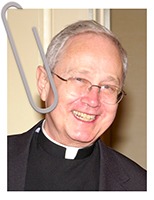A Vincentian View: Preaching in the Public Square
Fr. Pat Griffin of the Eastern Province of the Congregation of the Mission offers a unique insight into Jesus’ inaugural sermon in Luke 4: “The Spirit of the Lord is upon me; he has sent me to preach the Gospel to the poor.” It is the insight of Rev. Dr. William Barber, a prominent American Protestant minister and political activist who is the current holder of the Vincentian Chair of Social Justice at St. John’s University.
All of us in the Vincentian world know how our Founder treasured these words of Jesus as he read from the prophet Isaiah. Vincent recognized how this summons applied to him and to his mission. Reverend Barber holds this passage with a similar esteem and hears the call directing his ministry:
The Rev. Dr. William J. Barber, II has just written a book entitled “Revive Us Again: Vision and Action in Moral Organizing.” Bishop Barber (a minister in the United Church of Christ) currently holds the Vincentian Chair of Social Justice at St. John’s University. A nationally known figure around issues such as racism, voting rights, and the oppression of the poor, the Bishop is a dynamic and compelling speaker. He raises reactions on both sides of the aisle.
In this latest book, Reverend Barber spends some time reflecting upon Jesus’ inaugural sermon in Luke 4: “The Spirit of the Lord is upon me; he has sent me to preach the Gospel to the poor.” All of us in the Vincentian world know how our Founder treasured these words of Jesus as he read from the prophet Isaiah. Vincent recognized how this summons applied to him and to his mission. Reverend Barber holds this passage with a similar esteem and hears the call directing his ministry:
“If we pattern our preaching after Jesus, we learn that proclamation which begins in a space designated for worship, necessarily moves into the public square. . . nowhere is it clearer than in his inaugural sermon in his hometown of Nazareth.” (page 18)
I work hard at preparing my homilies and deliver them in a competent manner, but I confess to more than a mild timidity at being too confrontational. Upsetting people and forcefully challenging their way of living Gospel lives has not been my style.
Many times, I have preached on the passage from Luke and even given a workshop on it from a biblical point of view, but I had not allowed the particular direction of the force given to it by the Bishop to drive my thinking. He proclaims it to himself and others as a bidding to speak loudly and without fear of being too “political,” he prefers to speak of “moral.”
“Because God’s anointing threatens the existing political and economic systems of any society, its truth is resisted by the powerful. . . The spirit that wants to keep the good news of Jesus out of the public square is an unholy spirit.” (page 24)
The truth of this affirmation strikes me. The public square creates the positions that influence the status of the poor. Politics and party loyalty codify these dispositions in law. Can one preach the Gospel and stand up for the rights of the poor without being involved in the corridors of power, without being political? The caricature that politely separates the worship place from the work place serves only those who do not want to have the Gospel authoritatively heard in both spheres.
As we know, Vincent was a man firmly anchored in his time and in his place. He walked the poorest streets of Paris as well as the opulent halls of the palaces. He spoke politely, but never compromised his principles or the needs of the poor. One can discern how his words flowed from the centers of worship to the public square.



I have been privileged to hear Bishop Barber speak at St. John’s and was inspired and motivated to even more action by his use of the term – move out into the public square. Our political environment favors the rich and guess where that leaves the poor. So much more work to be done. We are blessed to have the fervor of Bishop Barber and the wisdom of Fr. Griffin to keep us on track.
In the political sphere as an informed (by the Gospel) critic makes sense to me. Organizing and raising consciousness make sense to me. The hard part is to remain indifferent to responses elicited by my participation in the political process and to maintain integrity as inevitable compromises are hammered out.
Thanks for this article. Replacing “political” with “moral” makes a lot of sense in discussing issues of the day, advocacy, systemic change etc. because to use “political” too often alienates people who immediately equate it with partisanship. Speaking to the morality, or lack of it, on the issues is really more to the point. Then of course when we get into organizing for change, it’s difficult to avoid using “political.”